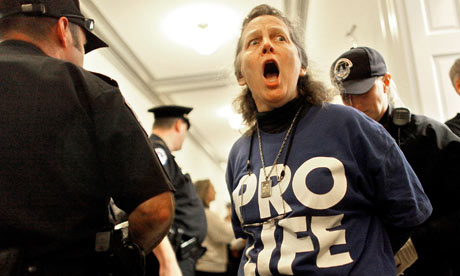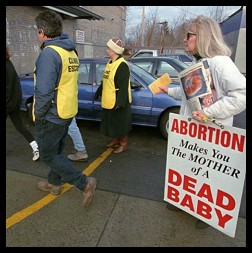“The right to have an abortion is a right to equity, it is the right to choice and is a right to allow a women to make the best decision she can about her situation without handing over the reigns to the judgment of others to make that decision on her behalf, often against concerns for her own safety.” Nadia Hussain, Why Abortion Matters to Me

It’s 7 a.m. on a Saturday morning in Jamaica, Queens. It’s January, so underneath the lab coat clinic escorts are wearing, I’m bundled up in a heavy coat, sweater, tights, and knee socks under my jeans. We are outnumbered by about 5 anti-abortionists to each clinic escort. Our job is to offer to walk with anyone who might be receiving medical attention at the clinic (or anyone who has to walk past it) to create a barrier between her and the people who are shouting and chanting and murmuring things like “You’re on your way to kill a baby.” “These escorts are helping you murder your baby right now–where will they be when you come back out?” “Jesus will still forgive you, just walk away now, it’s not too late!” “You will burn in hell for murdering your baby.”
The verbal abuse and aggressive proselytizing is not reserved just for patients. Community members, including many families with young children, young women, and commuters alike are forced to walk past graphic and gory 5 feet tall photographs of fetuses (often fake and always misleading). Female passersby are handed innocent-looking brochures (designed to look exactly like the clinic’s brochure). Men are encouraged to stop their wives and daughters from contributing to the so-called genocide of black babies. A young man of color, who I later overhear talking about being a junior in high school, is evangelizing, his voice booming across the winter morning air from under the heavy wooden cross yolked across his shoulders.
For some clinic escorts, one of the hardest things is to not engage with these fundamentalists and focus on your job: to keep women safe in the buffer zone and minimize the harm that anti-abortionists inflict on women and teens who are seeking safe and legal medical services at one of the few remaining places to do so in the country.

“To characterize buffer zone laws as nothing more than an infringement on the rights of concerned, sweet little old ladies is to erase over 4,700 incidents of clinic violence and over 140 clinic blockades [and 8 murders, 17 attempted murders, 42 bombings, 181 arson] that have taken place since 1995.” Michelle Kinsey Bruns, who has done clinic escorting in eight different states, in an interview with ThinkProgress
This latest ban that restricts abortion access is only one move in the game that a bare but powerful majority of U.S. supreme court is playing with the lives of millions of women in America on the line. Yesterday’s Hobby Lobby decision tramples of women’s access to necessary health care that includes contraceptive access and instead upholds the so-called rights of corporations, much in line with economic policies within our violent capitalist state. More anti-abortion laws have been passed between 2011 and 2013 that in the last 30 years.
Twenty-one states and Congress have considered sex-selective bans (the second-most popular ban nationally) since 2009 and eight states have actually done it. In South Dakota, these bans have been couched in racist, paternalistic language about Asian Americans in an Orientalist mashup of racism, misogyny, yellow peril, and the colonial savior mentality, and been another example of how white conservatives continue to use Asian Americans–otherwise invisible in the American political landscape–to fortify the status quo.
And these numbers do not include numerous other laws that restrict access to safe and legal reproductive health care. Anti-immigrant policies have real-life consequences on our families and children, not limited to backlogs, mass deportation, and inhumane detention without due process. Access to already-restricted public “benefits” like free or low-cost clinic access often require citizenship documentation. Any law withholding or restricting public assistance–already one of the most cumbersome and unintelligible systems to navigate–of course affects reproductive health. Wage and labor laws that do not offer or protect a basic quality of life require working class people to choose between contraception or utility bills, having a child or losing their job. The list goes on.

Antonio Gramsci said that “[h]istory has left us an infinity of traces.” One thing that APIAs share are long histories (and current realities) of systematic sexual violence under imperialist and colonial rule, sexual exploitation, hypersexualization, medical and environmental racism, immigration policies restricting or allowing our entry on the basis of perceived sexualities. Reproductive freedom must be a demand for APIA communities.